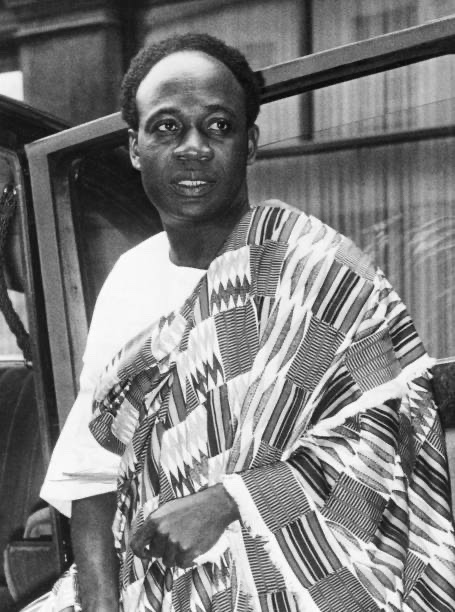Kwame Nkrumah, the first prime minister (1957-1960) and president (1960-1966) of the Republic of Ghana, was the leader of the first sub-Saharan African nation to gain its independence. He subsequently became a leading figure in the campaign for the United States of Africa. Nkrumah was born on September 21, 1909, in Nkroful, Gold Coast. The son of a goldsmith, he attended mission schools at Accra and government training colleges at Achimota (1926-1930) where he prepared to be a teacher.
In 1935, Nkrumah left for the United States where he attended Lincoln University (1935-1939) and the University of Pennsylvania (1939-1943). A gifted student, by 1943 Nkrumah had earned multiple bachelor’s and master’s degrees in economics, sociology, education, theology, and philosophy. Then, in May of 1945, Nkrumah departed for London, England, where he studied as a Ph.D. student at the London School of Economics. While in London, Nkrumah held key positions in anti-colonialist and Black-nationalist organizations and authored controversial papers calling for African independence and unity. In 1945, Nkrumah co-founded the Pan African Congress, which became an influential voice against colonialism in Africa.
In 1947, Nkrumah returned to the Gold Coast and became general secretary of the newly-founded United Gold Coast Convention. However, in 1949 Nkrumah split with the organization over its political objectives and formed the Convention People’s Party (CPP). During his tenure as head of the CPP, Nkrumah protested British rule and led numerous petitions for self-government. Imprisoned by the British in 1950 for his political activities, Nkrumah was released in 1951 when his party won the general election in a landslide victory. He subsequently was elected prime minister in 1952.
As prime minister, Nkrumah led an aggressive campaign for independence and achieved it in 1957. Three years later, he formed a new government, the Republic of Ghana. A devoted Pan-Africanist, Nkrumah forged alliances with both Guinea and Mali and sought to create a league of African states with its own government. To help achieve this goal, in 1963 he and other African leaders formed the Organization of African Unity. Choosing to remain neutral in political affairs outside of the African continent, Nkrumah initially gained tentative support from both the United States and the Soviet Union, receiving economic and technical aid from both countries.
Vigorously suppressing political dissidents, Nkrumah almost immediately was branded a dictator by his political opponents. Then, in 1961 a firestorm of protest erupted after he appointed himself supreme commander of the armed forces and absolute head of the CPP. Nkrumah subsequently outlawed all other political parties.
In 1966, Nkrumah’s government was overthrown by a coup d’état while he was on a trip to Beijing, China. Taking refuge in Guinea, Nkrumah spent the rest of his life in exile. He died in Bucharest, Romania on April 27, 1972.
Megathreads and spaces to hang out:
- ❤️ Come listen to music and Watch movies with your fellow Hexbears nerd, in Cy.tube
- 💖 Come talk in the New Weekly Queer thread
- 💛 Read and talk about a current topics in the News Megathread
- ⭐️ September Movie Nominations ⭐️
reminders:
- 💚 You nerds can join specific comms to see posts about all sorts of topics
- 💙 Hexbear’s algorithm prioritizes comments over upbears
- 💜 Sorting by new you nerd
- 🌈 If you ever want to make your own megathread, you can reserve a spot here nerd
- 🐶 Join the unofficial Hexbear-adjacent Mastodon instance toots.matapacos.dog
Links To Resources (Aid and Theory):
Aid:
Theory:


I go back and forth on whether call centers are valid military targets.
"We're experiencing an unusually high call volume" don't piss in my face and tell me it's raining we all know you're deliberately understaffing and extending wait times to make people give up.